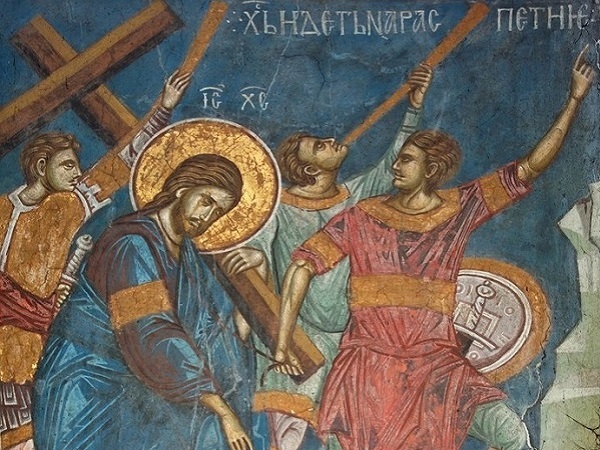Venerating the Cross of Christ (Ioannis Karavidopoulos, Professor of the School of Thelogy of the University of Thessaloniki)
11 Μαρτίου 2018
In the middle of Great Lent, on the third Sunday of the fast, the Church presents the Cross for veneration by the faithful, so that they can be strengthened in their spiritual struggle, which will bring them to Great Week and Easter. On that day, the Gospel reading contains Christ’s words to His disciples, just after He’s foretold his coming death on the Cross to them: ‘Then he called the crowd to him along with his disciples and said: ‘Those who want to be my disciples must deny themselves and take up their cross and follow me. For whoever wants to save their soul will lose it, but whoever loses their life for me and for the gospel will save it. What good is it for someone to gain the whole world, yet forfeit their soul? Or what can anyone give in exchange for their soul? If anyone is ashamed of me and my words in this adulterous and sinful generation, the Son of Man will be ashamed of them when he comes in his Father’s glory with the holy angels.’
And He went on to assure them: ‘Truly I tell you, some who are standing here will not taste death before they see that the kingdom of God has come with power’. [1]

These words are very important and weighty for those who wish to be disciples of Jesus. Since Christ had to deal not with glory but with the passion and the cross, the fate of His disciples can hardly be any different, if, of course, they desire to be true disciples, not in name only. And, naturally, ‘disciples’ here is used in the broader sense of the words, that is ‘Christians who faithfully and consciously follow the Lord Jesus Christ’.
There’s no coercion in Christ’s teaching. You can choose the way of the cross freely, after first having assessed the difficulties and undertaken your responsibilities resolutely. ‘Those who wish to follow me should first renounce their self and then they can follow me’. The renunciation of our self and the acceptance of the cross upon our shoulders are the two fundamental pre-requisites for us to follow Christ. Renunciation of your self means you abandon all your legal and just demands, the natural and justifiable desires that your ego has, you reject the security of a comfortable life in order to give yourself over to what the world considers the uncertainty and insecurity of following Christ on the path of suffering. As we all know, practically-minded people want to be well-placed and secure and to avoid any thought of death, preferring to protract their life by any means available.
But by an argument which is foreign to human reason, Christ teaches that life is gained only when it’s lost. Sacrificing your life means gaining it to its fullest extent. Christ uses the word ‘soul’ in these instances with the dual meaning of biological life and eternal life, which is the gift of God. If you want real life, you have to sacrifice the life of this world.
These words presuppose, or foresee situations of persecution in which people might be afraid and renounce their faith, with the result that they will lose real life. But the words are just as significant even when there’s no persecution. It’s self-evident that if you compromise with the powers of this world and find a comfortable niche in organized society, you aren’t going to face persecution, suffering or the need to sacrifice your life.

So in what circumstances can we talk about the cross and suffering in our life today? Are these, perhaps, heroic instances from the Church’s past? Conscientious Christianity isn’t merely the historic past, but may also be a part of the living present. When, in a world of debased values, you can still believe in the values of faith; when in the face of routine lies, you can side with the truth; when everybody’s doing their best to satisfy their own interests and you refuse to; when everybody compromises in order to make sure they’re all right and you refuse to betray your principles, at the risk of losing you job, say; when everybody gives a rationalistic explanation for everything, from a secular point of view, and your own heart is warmed by the hope of the resurrection: then you’re a true disciple of Christ, following Him on the path of sacrifice.
All of this, which seems impossible for normal people, becomes reality in the realm of the grace of God, which regenerates and transforms us into something new, into a ‘new creation’.
And so, today’s Gospel reading provides us with a message of voluntary self-denial, not for any other reason but for Christ and the Gospel. The heroes and heroines of the faith and the saints of our Church aren’t merely figures from the dim and distant past, but can also be living personalities in our own times.
The reading ends with the presence of the Kingdom of God. It’s this which gives Christians the potential to make all the above come true. The Kingdom of God isn’t simply a vision of the future, but is also a present reality. It’s the possibility for us to live the future fulness of the kingdom even in this present life.





